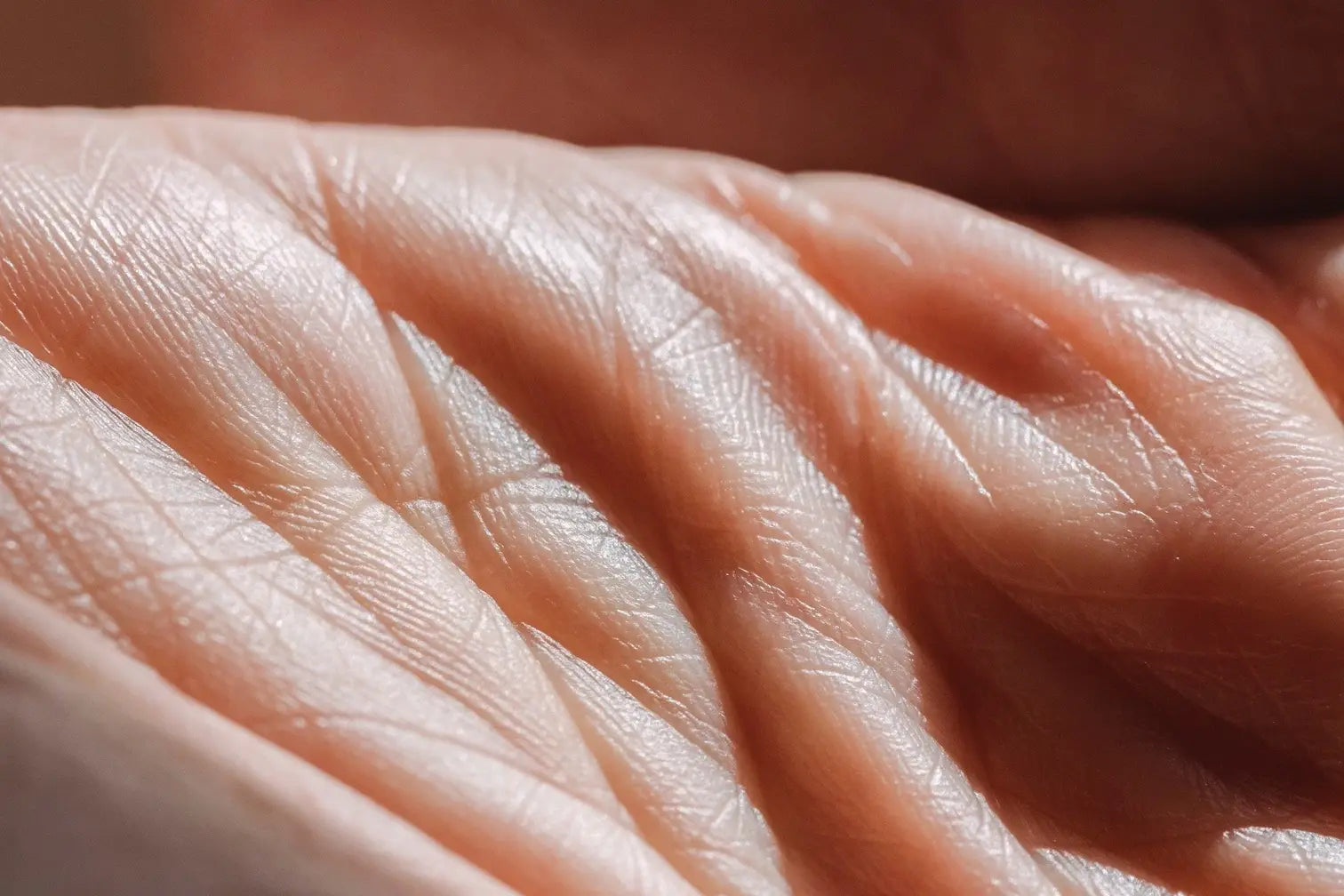What causes wrinkles?
Intrinsic Aging
Genetics
A person's genetic makeup accounts for as much as 60% of skin aging . 1 Genetic factors are responsible for the level of collagen and elastin production in the skin, and their rate of breakdown. (Read more about the importance of collagen and elastin for skin elasticity hereto learn more about collagen and elastin here!)
Collagen Decline

Extrinsic Aging
Sun Exposure
Smoking
Smoking cigarettes or consuming other nicotine products can have detrimental impacts on the health of your skin. Nicotine consumption narrows our body’s capillaries: the thin blood vessels that supply the nutrients necessary for collagen production in the skin. Smokers can have as much as a 20% decrease in collagen synthesis, making the skin dry, dull, and prone to premature wrinkling . 4
Layers of the skin
Epidermis
What is the epidermis? The epidermis is the thinnest and outermost layer of the skin, serving as a protective barrier between the body and the external environment. It is also the layer of skin where wrinkles form and appear . 5 The epidermis rests on top of the other deeper layers of the skin; this means that changes to strength, elasticity, and fat deposits deep in the skin cause mechanical stresses to the epidermis that manifest as wrinkles.Dermis
So, what is the dermis? It is the middle layer of the skin, and is mainly responsible for supporting the epidermis. To do this it has a tightly bound network of collagen and elastin fibers that prevents wrinkling of the epidermis. Aging related loss of collagen weakens the skin and causes the dermis to physically thin as a wrinkle forms . 6 A wrinkle will cause the dermis in that area to shrink to half of its original thickness and permanently cause a crease to form.Hypodermis
How to prevent wrinkles
Sun Protection
Adequate sun protection throughout the day, even on cloudy days is key to skin health and preventing wrinkles anywhere from neck wrinkles to stomach wrinkles. After all, up to 90% of the visible signs of skin aging can be caused by sun damage . 8 Try to avoid UV exposure during peak UV hours by covering up or staying indoors. Avoiding artificial sources of UV radiation like tanning beds is always a good idea.
Moisturizing
Nutrition
Cells on the surface of our skin continue to get replaced and replenished with younger cells, however the rate of this cellular turnover decreases with age. To keep this turnover process at top speed, skin requires a lot of resources. Our diet is one of our strongest tools in supporting skin health, as it provides energy and the building blocks for new cells.-
Antioxidants for Repairing Healthy Collagen: Antioxidants
neutralize free radicals within our body that would otherwise cause harm to skin cells and break down collagen. 10 A diet rich in antioxidants can prevent this form of damage from accumulating with age, reducing the prevalence of skin wrinkles.
-
Protein for Collagen & Elastin Synthesis: Because skin is constantly renewing itself, it requires a consistent supply of proteins to rebuild collagen and elastin. Many of these proteins cannot be synthesized by the body and must be consumed through foods like fish, meat, dairy, fruit, and legumes. 11
-
Healthy Fats for a Strong Lipid Barrier: Unlike saturated fats, unsaturated fats are used by the body's cells to ensure a healthy lipid balance. A diet high in Omega 3 fatty acids, polysaturated, and monounsaturated fats keep the skin barrier healthy by aiding in moisture retention. 12 Fish, vegetable oils, nuts, seeds, avocados, and dark chocolate are all sources of these unsaturated fats.
OS-01 Peptide
- Increase skin’s epidermal thickness
*
-
Increase a key biomarker associated with collagen production, COL1A1*
-
Decrease UV-induced collagen degradation enzyme, MMP3*
-
Increase a key biomarker associated with hyaluronic acid production, HAS2*
- Intrinsic aging is largely predetermined and results from factors such as genetics and the natural decline of collagen, leading to dynamic wrinkles.
- Extrinsic aging is primarily influenced by environmental factors like sun exposure and smoking, which can cause static wrinkles.
- To prevent wrinkles and slow down skin aging, consider strategies like sun protection, moisturizing, and proper nutrition.
- Protecting your skin from UV exposure is crucial, as up to 90% of visible skin aging can be attributed to sun damage.
- Maintaining skin moisture with daily moisturizers, including ingredients like hyaluronic acid and lipids, can help prevent pronounced dynamic skin wrinkles.
- A balanced diet rich in antioxidants, proteins for collagen and elastin synthesis, and healthy fats can support skin health and reduce the prevalence of wrinkles.
- Consider using OneSkin's Topical Supplements, OS-01 FACE, OS-01 EYE, and OS-01 BODY, powered by the OS-01 peptide, which has demonstrated benefits like increasing epidermal thickness, collagen production, and hyaluronic acid production while reducing UV-induced collagen degradation.



